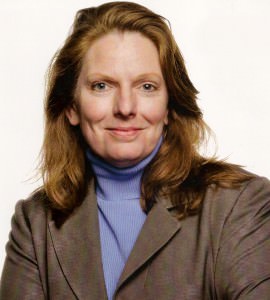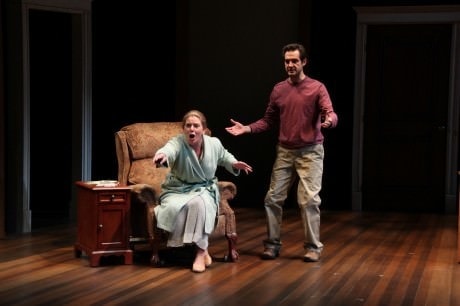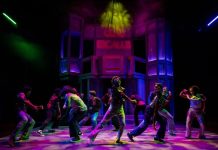This is Part Two of a series of interviews with the talented cast of Round House Theatre’s How to Write a New Book for the Bible. Today, meet MaryBeth Wise.

Joel: Why did you want to be involved in this production?
MaryBeth: I wanted to be involved with this production because I was very moved after reading the play. It is so filled with heart and with humor. It took many MANY reads for me to be able to get through it without crying. So, I thought, “There is something in this. I should do it!” It was clear that this play would be challenging to work on. I auditioned for Ryan and really had a great time in the audition room. I liked how he worked and suggested exercises to explore Mary’s physicality at different ages. I really wanted to work with Ryan after this audition experience.
Introduce us to your character.
I play Mary Cain, the mother of the narrator of the play, Bill Cain (who is also the playwright). The play goes back and forth in time (sometimes on one line), so you see Mary in her eighties, in her sixties, and in her forties.
How do you relate to her?
Let’s see…There are a number of commonalities that I have with Mary Cain. I love this exercise – seeing what I and my character have in common and where the stem of the “Y” begins to separate – where we are different. Mary Cain does come from an Irish background, as do I. I come from an Irish Catholic family. The descriptions of the family arguments or discussions are very familiar to me as well. Mary speaks her mind and has high expectations of herself those around her. There is also an interesting element—a seeming inability to trust, or accept what “is” – the “status quo.” She “works hard” and her way of solving a problem is to keep working at it. One of her lines in the play is “Times were rough. We worked very hard. Things got better.” I relate to Mary on some significant levels.
What is the play about from your character’s point of view?
This is difficult to answer without giving too much of the play away. I guess, from Mary’s point of view it is about her grappling with her illness and death, about her love for her sons and her desire to understand the choices she has made through life which happens through memory and flashback. It is about how she makes sense of her experience and connects with those she loves.
What personal experiences did you bring to your performance and does the character remind you of a family member? Did you base your performance on someone else?
There are many experiences and memories that come up during performances and rehearsals. There are different aspects of family members in Mary. I think we bring all of our experiences to every role we play – we are the sum of our experience and our imagination – all of that is usable and used.
Are you a religious person? Did the show challenge and/or change any of your religious beliefs or views?
I am a spiritual person and try to engage in a “spiritual practice” which takes many forms. The play explores the notion that the divine presence/God / the Life Force (whatever name we give it) is found in everything and found by being present to the moment, to the “other,” to ourselves, and to experience-(both difficult and easy). It is very Buddhist/Jewish/Christian – that God is found in the present-in the “here and now” and in our relationships with others. Doing this play re-affirmed and deepened my beliefs about where the divine can be found. It also compelled me to order a couple of books on Ignatian spirituality.
How does religion play an important role in the play and in your character’s life?
Religion/Spirituality plays a significant role in Mary’s life. She starts to pray immediately when she fears that her son may be harmed in Viet Nam. She doubts as well-and questions her priest/son – “Does God answer prayers?”
Bill Cain puts you through the ‘emotional wringer.’ How would you describe his writing here?
Bill Cain’s writing is like poetry-very economical. In just a few lines, a few words, he can communicates many levels of depth/complexity. He is also extremely funny – he has written some amazing arguments/scenes that are hilarious because they are so true!
What impresses you most about how about the lines he wrote for your character?
The economy of it all – The way Mary speaks tells you much about her character/background.
What is/are your favorite line or lines that your character recites and what is your favorite line that someone else in the play recites?
“No Billy, No Butter” is one of my favorite lines—I like the whole butter sequence because the rhythm is so fun – doing that scene is like white water rafting to me!
What has surprised you most about the audience reaction to the show? And what has been the most ‘interesting’ or ‘surprising’ response you have heard from an audience member after the show?
I knew the play was very moving after reading the script. What surprises me is how open audience members are to telling their own stories and relating their own experiences with the subject matter of the play. The audiences seem to have a very visceral experience with this piece and seem to want to share very personal stories and/or reflect deeply on what they have experienced in their own lives.
You have some amazing designers working on this production. How does the design enhance the story or atmosphere? Is there a scene where you say, “WOW! – the design is so effective and/or stunning here.’
There are many moments where I am “wowed” by the beauty around me—whether it is in the lights or in the moments where sound envelopes me and helps to propel me to the next moment. Colin Bills is a very talented Lighting Designer and Eric Shimelonis’ music is stunning. I feel very fortunate to be working with Rosemary Pardee who always creates costumes that an actor can move freely in and help define who that person is. Dan Conway’s set is a great palette to work on. Dre Moore is a fantastic props designer as well. I don’t want to define specific design moments that propel me – I don’t want to touch them by describing them in words—just come and see! I will say I love my teacups!:
What does How to Write a New Book for the Bible have to say about and to families?
I think one thing the play says is that those people in your life your birth families, your chosen families, all play a role in helping us find truth.
What has been the most fun working with your fellow actors in this production?
I love this company! I love their generosity and willingness to explore this script anew each night.
What impresses you most about their performances?
Their focus.
This is Ryan Rilette’s directorial debut at Round House Theatre. How would you describe his directing style?
He is terrific. Very prepared and has lots of wonderful ideas about how to approach a scene but at the same time will allow actors to play and discover specific moments-try different things. He is very collaborative and lots of fun in the rehearsal room.
How has he helped you mold your performance, and what has been the most beneficial advice or suggestions he gave you about portraying your character?
Ryan’s best advice to me was to “trust” the work and relax. He was very good at allowing the actors to take their time to find moments during scene rehearsals.

How has this experience made you a better actor and what did you learn about yourself as an actor being in this production?
I think/hope that every experience makes one a better actor. I feel I have grown as an actor by exploring this wonderful play and working with the wonderful actors in this production. Working on the physicality of Mary at different ages and switching in a moment from one age to another and from past to present was challenging. I learned allow the language to do its work and to “get out of my own way” as much as possible.
What’s next for you on the stage?
I have nothing scheduled – so, it is a mystery….:)
What do you want audiences to take with them after seeing How to Write a New Book for the Bible?
I want audiences to take with them whatever they need on that particular day/evening. Whether it is to more consciously cherish the people they love and others around them or to be more open to the “aha!” moments in everyday life.
How to Write a New Book for the Bible plays through May 5, 2013 at Round House Theatre – 4545 East West Highway, in Bethesda, MD. For tickets, call the box office at by phone at (240) 644-1100, or in person at the box office, or purchase them online.
LINKS
Part 1: ‘Raising Cain: Meet the Cast of ‘How to Write a New Book for the Bible’: Meet Mitchell Hébert.’
Part 2: ‘Raising Cain: Meet the Cast of ‘How to Write a New Book for the Bible’: Meet MaryBeth Wise.’
Read Rick Westerkamp’s review of How to Write A New Book for the Bible on DCMetroTheaterArts.
Here is the cast and Artistic Team of Round House Theatre’s How to Write a New Book for the Bible.




